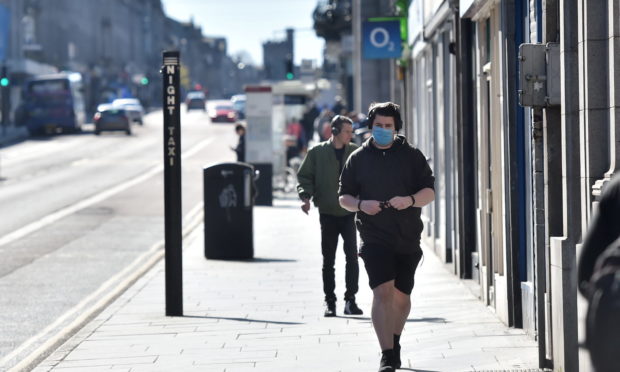The co-leader of Aberdeen City Council has warned the coronavirus crisis could leave the local authority with a £50million funding gap, threatening jobs and services.
Douglas Lumsden claims a lack of income could leave the council with a shortfall of around double the cost of construction work in the city’s Union Terrace Gardens.
The warning comes as northern local authorities brace for the financial hit of the pandemic, taking in less cash through things like parking charges and raised by facilities such as coronavirus-closed leisure centres.
While more than £3.3billion has been passed to the Scottish Government by Westminster to tackle the virus, none has so far been awarded to local authorities.
In England, more than £1.6bn has been issued to councils – prompting calls for Scottish councils to be given equivalent funding from Holyrood.
Mr Lumsden has written to local government minister Kevin Stewart twice in the last week, warning the Aberdeen Central MSP that it is “imperative” money is shared otherwise “vital public services will diminish and job losses will be inevitable”.
The Conservative co-leader of Aberdeen council said: “While it is welcome that most of the funding from UK Government is going to businesses to help them stay afloat at this difficult time, it is noticeable none of the money has been allocated by the Scottish Govnernment for local authorities.
“Aberdeen City Council is at the forefront of protecting people at this time and we are responding to the Scottish Government’s request to provide grants to businesses who meet their requirements.”
“I am concerned that our budget shortfall following the coronavirus pandemic could be as high as £50million.”
He added that despite taking “difficult decisions” last month in making nearly £40m worth of cuts to council spending this year, “everything would have to be looked at again”.
A report will be brought to councillors at an urgent business committee meeting next month, outlining the full financial position of the council in Aberdeen.
And as worrying as Mr Lumsden’s predictions are, his Highland counterpart fears they may be “on the low side”.
Leader Margaret Davidson warned income had dropped to “almost zero” in many cases, citing lost revenue from leisure centres and the region’s ports.
She also said the council would no longer be able to realise savings agreed during the budget setting process less than two months ago.
Mrs Davidson told The P&J: “The gap is going to be substantial and we need supportive statements to councils from the Scottish Government.
“There are so many unknowns – these figures could be substantially out.
“We need to be speaking about a recovery budget for the country.”
Other north-east council bosses said despite “endless discussions” regarding their finances, they were “nowhere near knowing” the likely cost.
Aberdeenshire Council’s leader Jim Gifford added his voice to calls for additional funding passed to Scotland for local authorities to be given to councils “as quickly as possible”.
“In the short term we need the money sent to us so we have some certainty – my plea to Kevin Stewart and other ministers would be to issue funding as quickly as possible so we all know where we stand.”
Moray’s Graham Leadbitter said he didn’t want to “second guess” council officers calculating the financial damage but said the local authority was working very closely with Cosla and the Scottish Government to develop strategies on the council’s finances, service provision and on the economic recovery of the area.
But last night local government minister Kevin Stewart said money allocated to Scotland through the coronavirus emergency response fund – due to Scotland as a consequence of UK Government spending elsewhere – had already been pledged to other causes.
Those included additional funding for NHS staff, business support and helping charities deal with consequences of Covid-19.
He added: “While we welcome the funding provided to date, we continue to strongly press the UK Government for urgent additional funding for the health service, local government and care sector to adequately deal with the scale of this crisis.
“We remain in regular contact with councils about how best we can continue to support local authorities during this period.”
